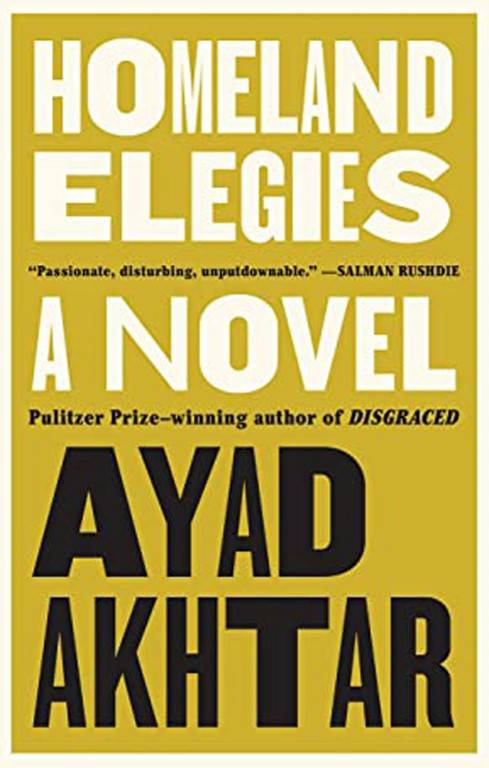
Homeland Elegies by Ayad Akhtar. This muscular, multilayered second novel from Drama Pulitzer Prize-winning writer Ayad Akhtar evokes memories of the opening line of the review of Salman Rushdie’s brilliant blockbuster Midnight’s Children by Clark Blaise in The New York Times in April 1981: “The literary map of India is about to be redrawn.” Akhtar, already well known for his plays that provide searing portraits of American life and the struggle of new Americans to belong, has staked his claim to becoming this generation’s Great American Novelist. He follows in the tradition of Philip Roth and Saul Bellow and he pays homage to Salman Rushdie, who opened the gates to South Asian fiction in English. You will want to finish this gripping book in one sitting.
Akhtar’s first published novel was American Dervish. In fact, that was his third novel, as he had discarded two earlier attempts. That novel chronicled the coming of age of a young American-born son of Pakistani immigrants in Middle America balancing between the traditions and ambitions of his parents as they adjusted to life in their new homeland and his own discoveries. Weaving imagination and autobiography into an intriguing tale in this new novel. Dervish became the template for the continuation of the story of the grown-up writer who shares the author’s real name and some of his history. His plays include Disgraced that won him the Pulitzer, and my personal favorite The Invisible Hand.
In Homeland Elegies we meet the author who has become a successful playwright, won a Pulitzer for his play, made a lot of money via the financial legerdemain of one of his Muslim friends, and even had a run in with the law. Meanwhile, his father, a successful physician, who once treated Donald Trump and befriended him, and his mother struggle against the pain of becoming Americans, while trying to retain the imagined culture and mores of their original homeland Pakistan.
This novel brings out the conflict that countless immigrant families face as they adjust to exile in a society where they are a minority and constantly under suspicion. Where they have to work extra hard to prove their worth, and where they have to constantly and repeatedly prove their loyalty to their new homeland. Do they really belong? It is also a story of the conflict between the immigrants and their first-generation children who are American by birth, the ever-present divergence between fathers and sons, and the search for a mooring in a society where success often demands that you become rich, play the system, cut corners, and lose your moral compass. In fact, as Akhtar discovers in this finely crafted novel that has all the hallmarks of a Mughal miniature that tells a deeper and broader story than it conveys to the first glance, the moral issues are no different in either homeland. His parents carry the baggage of their earlier lives. Their son is not bound to do the same.

But the successful playwright faces scrutiny from the law. The often double-standard that is applied to immigrants leads to the Securities and Exchange Commission sending an investigator to his sparse apartment in Manhattan. Agent Zakeeya Watkins, surprised that he is not showing off his newfound wealth, wants to know of any sleight of hand that might have been employed by Timur, the investor friend. Timur had multiplied Akhtar’s money and his own by taking out short positions against the debt that he had sold to municipalities that were incapable of sustaining their debts. Seemingly convinced of his innocence, she warns him before leaving.
An emboldened Akhtar says to her:
“I mean honestly, what you’re describing doesn’t sound any worse than what Goldman did in 2010.”
“Your friend’s no Goldman Sachs.”
“That he’s not.”
“Wrong color,” she said, as she stood buttoning her blazer. “And praying to the wrong God. But you didn’t hear it from me.”
Shades of how BCCI was hounded out of existence in the late 1980s while Citibank and others got away with paying fines for money laundering in the same period. Even today, the system continues to show homegrown financial giants leniency in such matters. As recently as October 7, The New York Times blared: “Citigroup is fined $400 million over ‘longstanding’ internal problems,” for “unsafe and unsound banking practices including in its programs to catch money launderers.” American banks were fined a record $10 billion in the 15-month period ending in March 2020, of which more than 60 percent were for violating anti-money laundering rules (Fortune, March 11,2020 story by Jeff John Roberts.) Plus ca change…
Ayad Akhtar creates cognitive dissonance in the minds of his complacent American readers by crafting a story that exposes the internal contradictions of Trumpian America. The current pandemic may well force a generation of new readers to rethink how they comport themselves and treat the new Americans who are helping revivify American society and economy with their enterprise and creativity. Many of these older Americans, some 40 percent, if Trump’s political base is a good indicator, want to not merely circle their wagons but also find ingenious ways to exclude and expel the new immigrants and their American progeny.
However, as Akhtar the author and Akhtar the protagonist of this bold, ribald, and exciting American story illustrates, he is not leaving or kowtowing to the fading Ancien Regime.
In answer to the often-repeated question hurled by Trump supporters:
“Why don’t you go back to where you came from?” Akhtar replies firmly and clearly:
“I’m here because I was born and raised here. This is where I’ve lived my whole life. For better, for worse — and it’s always a bit of both — I don’t want to be anywhere else. I’ve never even thought about it. America is my home.”
In other words. We are here to stay. Deal with it!
The writer is Distinguished Fellow at the South Asia Center of the Atlantic Council in Washington DC. His latest book is The Battle for Pakistan: The Bitter US Friendship and a Tough Neighbourhood (Penguin Random House 2019, Liberty Books, Pakistan 2019, and Rowman and Littlefield 2020)
Akhtar’s first published novel was American Dervish. In fact, that was his third novel, as he had discarded two earlier attempts. That novel chronicled the coming of age of a young American-born son of Pakistani immigrants in Middle America balancing between the traditions and ambitions of his parents as they adjusted to life in their new homeland and his own discoveries. Weaving imagination and autobiography into an intriguing tale in this new novel. Dervish became the template for the continuation of the story of the grown-up writer who shares the author’s real name and some of his history. His plays include Disgraced that won him the Pulitzer, and my personal favorite The Invisible Hand.
In Homeland Elegies we meet the author who has become a successful playwright, won a Pulitzer for his play, made a lot of money via the financial legerdemain of one of his Muslim friends, and even had a run in with the law. Meanwhile, his father, a successful physician, who once treated Donald Trump and befriended him, and his mother struggle against the pain of becoming Americans, while trying to retain the imagined culture and mores of their original homeland Pakistan.
This novel brings out the conflict that countless immigrant families face as they adjust to exile in a society where they are a minority and constantly under suspicion. Where they have to work extra hard to prove their worth, and where they have to constantly and repeatedly prove their loyalty to their new homeland. Do they really belong? It is also a story of the conflict between the immigrants and their first-generation children who are American by birth, the ever-present divergence between fathers and sons, and the search for a mooring in a society where success often demands that you become rich, play the system, cut corners, and lose your moral compass. In fact, as Akhtar discovers in this finely crafted novel that has all the hallmarks of a Mughal miniature that tells a deeper and broader story than it conveys to the first glance, the moral issues are no different in either homeland. His parents carry the baggage of their earlier lives. Their son is not bound to do the same.

But the successful playwright faces scrutiny from the law. The often double-standard that is applied to immigrants leads to the Securities and Exchange Commission sending an investigator to his sparse apartment in Manhattan. Agent Zakeeya Watkins, surprised that he is not showing off his newfound wealth, wants to know of any sleight of hand that might have been employed by Timur, the investor friend. Timur had multiplied Akhtar’s money and his own by taking out short positions against the debt that he had sold to municipalities that were incapable of sustaining their debts. Seemingly convinced of his innocence, she warns him before leaving.
An emboldened Akhtar says to her:
“I mean honestly, what you’re describing doesn’t sound any worse than what Goldman did in 2010.”
“Your friend’s no Goldman Sachs.”
“That he’s not.”
“Wrong color,” she said, as she stood buttoning her blazer. “And praying to the wrong God. But you didn’t hear it from me.”
Shades of how BCCI was hounded out of existence in the late 1980s while Citibank and others got away with paying fines for money laundering in the same period. Even today, the system continues to show homegrown financial giants leniency in such matters. As recently as October 7, The New York Times blared: “Citigroup is fined $400 million over ‘longstanding’ internal problems,” for “unsafe and unsound banking practices including in its programs to catch money launderers.” American banks were fined a record $10 billion in the 15-month period ending in March 2020, of which more than 60 percent were for violating anti-money laundering rules (Fortune, March 11,2020 story by Jeff John Roberts.) Plus ca change…
Ayad Akhtar creates cognitive dissonance in the minds of his complacent American readers by crafting a story that exposes the internal contradictions of Trumpian America. The current pandemic may well force a generation of new readers to rethink how they comport themselves and treat the new Americans who are helping revivify American society and economy with their enterprise and creativity. Many of these older Americans, some 40 percent, if Trump’s political base is a good indicator, want to not merely circle their wagons but also find ingenious ways to exclude and expel the new immigrants and their American progeny.
However, as Akhtar the author and Akhtar the protagonist of this bold, ribald, and exciting American story illustrates, he is not leaving or kowtowing to the fading Ancien Regime.
In answer to the often-repeated question hurled by Trump supporters:
“Why don’t you go back to where you came from?” Akhtar replies firmly and clearly:
“I’m here because I was born and raised here. This is where I’ve lived my whole life. For better, for worse — and it’s always a bit of both — I don’t want to be anywhere else. I’ve never even thought about it. America is my home.”
In other words. We are here to stay. Deal with it!
The writer is Distinguished Fellow at the South Asia Center of the Atlantic Council in Washington DC. His latest book is The Battle for Pakistan: The Bitter US Friendship and a Tough Neighbourhood (Penguin Random House 2019, Liberty Books, Pakistan 2019, and Rowman and Littlefield 2020)

